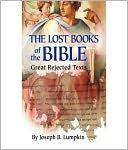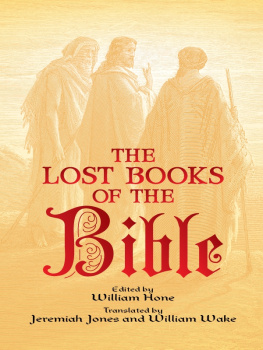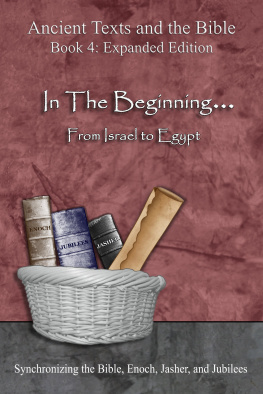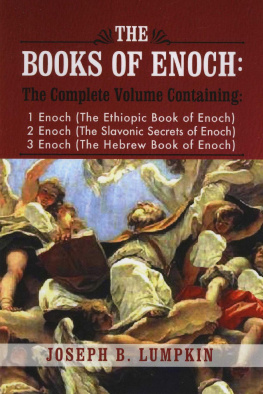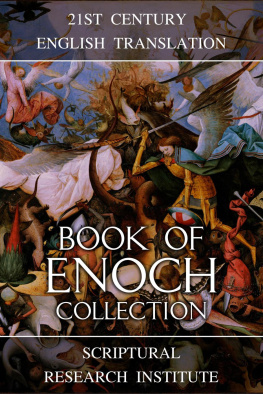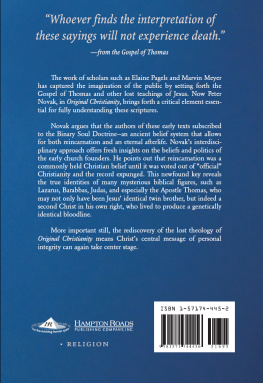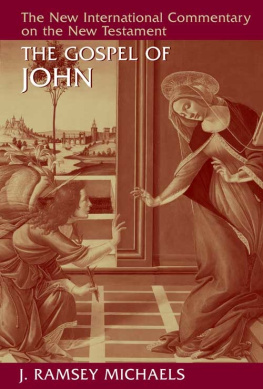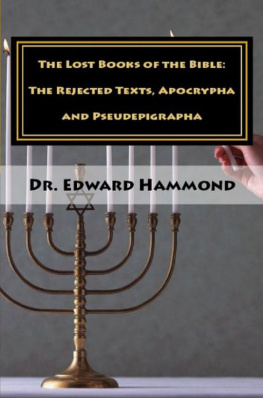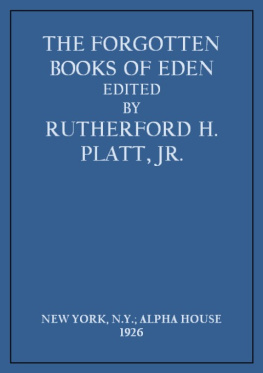Lost Books of the Bible:
The Great Rejected Texts
By Joseph B. Lumpkin
The Lost Books of the Bible: The Rejected Texts
Copyright 2009 Joseph B. Lumpkin.
All rights reserved.
Printed in the United States of America. No part of this book may be used or reproduced in any manner whatsoever without written permission except in the case of brief quotations embodied in critical articles and reviews.
First time or interested authors, contact Fifth Estate Publishers,
Post Office Box 116, Blountsville, AL 35031.
First Printing February 2009
Cover Design by An Quigley
Printed on acid-free paper
Library of Congress Control No: 2009903201
ISBN13: 9781933580661
ISBN: 1933580666

Fifth Estate 2009
TABLE OF CONTENTS
Story of Ahikar
29th Chapter of Acts
*INTRODUCTION*
The study of scripture is a lifelong venture. Many times our search for deeper understanding of the holy book leads to questions beyond the Bible itself. As we encounter references to social conditions, cultural practices, and even other writings mentioned within the scriptures we are called to investigate and expand our knowledge in order to fully appreciate the context, knowledge base, and cultural significance of what is being taught. Thus, to fully understand the Bible, we are necessarily drawn to sources outside the Bible. These sources add to the historical, social, or theological understanding of Biblical times. As our view becomes more macrocosmic, we see the panoramic setting and further understand the full truth within the scriptures.
To point us to the sources we should be concerned with, we must know which books were popular and important at the time. There are several books mentioned in the Bible, which are not included in the Bible. They are not spiritual canon, either because they were not available at the time the canon was originally adopted, or at the time they were not considered inspired. In cases when inspiration was questioned, one could argue that any book quoted or mentioned by a prophet or an apostle should be considered as spiritual canon, unfortunately this position would prove too simplistic.
Books and writings can fall under various categories such as civil records and laws, historical documents, or spiritual writings. A city or state census is not inspired, but it could add insight into certain areas of life. Spiritual writings which are directly quoted in the Bible serve as insights into the beliefs of the writer or what was considered acceptable by society at the time. As with any new discovery, invention, or belief, the new is interpreted based upon the structure of what came before. This was the way in the first century Christian church as beliefs were based upon the old Jewish understanding. Although, one should realize pagan beliefs were also added to the church as non-Jewish populations were converted, bringing with them the foundations of their beliefs on which they interpreted Christianity. In the case of Jude, James, Paul, and others, the Jewish past was giving way to the Christian present but their understanding and doctrine were still being influenced by what they had learned and experienced previously. It becomes obvious that to understand the Bible one should endeavor to investigate the books and doctrines that most influenced the writers of the Bible. Some of these doctrines evolved to become todays faith. Some diverged and competed as with orthodox doctrine, other simply faded away.
The Dead Sea Scrolls found in the caves of Qumran are of great interest in the venture of clarifying the history and doctrine in existence between biblical times and the fixing of canon. The scrolls were penned in the second century B.C. and were in use at least until the destruction of the second temple in 70 A.D. Similar scrolls to those found in the eleven caves of Qumran were also found at the Masada stronghold which fell in 73 A.D. Fragments of every book of the Old Testament except Esther were found in the caves of Qumran, but so were many other books. Some of these books are considered to have been of equal importance and influence to the people of Qumran and to the writers and scholars of the time. Some of those studying the scrolls found in Qumran were the writers of the New Testament.
Knowing this, one might ask which of the dozens of non-canonical books most influenced the writers of the New Testament. It is possible to ascertain the existence of certain influences within the Bible context by using the Bible itself. The Bible can direct us to other works in three ways. The work can be mentioned by name, as is the Book of Jasher. The work can be quoted within the Bible text, as is the case with the Book of Enoch. The existence of the work can be alluded to, as is the case of the missing letter from the apostle Paul to the Corinthians.
In the case of those books named in the Bible, one can set a list as the titles are named. The list is lengthier than one might at first suspect. Most of these works have not been found. Some have been unearthed but their authenticity is questioned. Others have been found and the link between scripture and scroll is generally accepted. Following is a list of books mentioned in the Holy Bible.
The Book of Jasher: There are two references to the book in the Old Testament:
2 Samuel 1:18 - Behold, it is written in the Book of Jasher. "So the sun stood still, and the moon stopped, until the nations avenged themselves of their enemies.
Joshua 10:13 - Is it not written in the Book of Jasher? And the sun stopped in the middle of the sky and did not hasten to go down for about a whole day.
There are several books which have come to us entitled, Book of Jasher. One is an ethical treatise from the Middle Ages. It begins with a section on the Mystery of the Creation of the World: It is clearly unrelated to the Biblical Book of Jasher.
Another was published in 1829 supposedly translated by Flaccus Albinus Alcuinus. It opens with the Chapter 1 Verse 1 reading: "While it was the beginning, darkness overspread the face of nature." It is now considered a fake.
The third and most important is by Midrash, first translated into English in 1840. It opens with Chapter 1 Verse 1 reading: "And God said, Let us make man in our image, after our likeness, and God created man in his own image." A comparison of Joshua 10:13 with Jasher 88:63-64 and 2Sam. 1:18 with Jasher 56:9 makes it clear that this Book of Jasher at least follows close enough with the Bible to be the Book of Jasher mentioned in the Bible.
The Book of Wars of the Lord: "Therefore it is said in the Book of the Wars of the Lord." Num. 21:14
The Annals of Jehu: "Now the rest of the acts of Jehoshaphat, first to last, behold, they are written in the annals of Jehu the son of Hanani, which is recorded in the Book of the Kings of Israel." 2 Chronicles 20:34
The treatise of the Book of the Kings: "As to his sons and the many oracles against him and the rebuilding of the house of God, behold, they are written in the treatise of the Book of the Kings. Then Amaziah his son became king in his place." 2 Chronicles 24:27
The Book of Records, Book of the Chronicles of Ahasuerus: "Now when the plot was investigated and found to be so, they were both hanged on a gallows; and it was written in the Book of the Chronicles in the kings presence." ... "During that night the king could not sleep so he gave an order to bring the book of records, the chronicles, and they were read before the king." Esther 2:23; 6:1
The Acts of Solomon: "Now the rest of the acts of Solomon and whatever he did, and his wisdom, are they not written in the book of the Acts of Solomon?" 1 Kings 11:41
Next page
